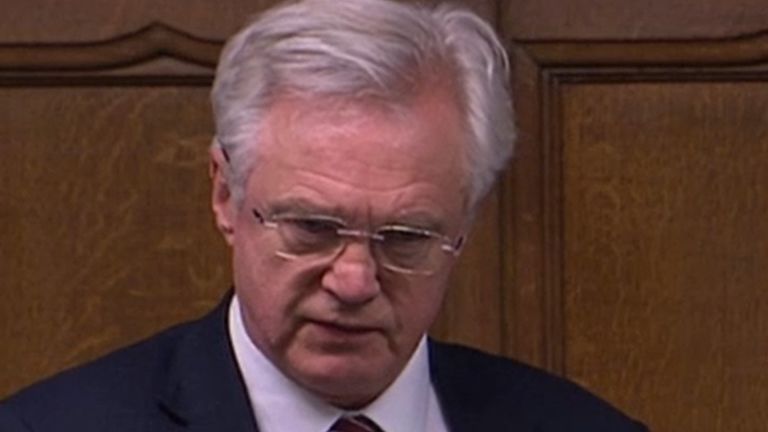Heralding the end of the transition phase and a new chapter of UK-EU relations, Boris Johnson told the country correctly that "this is the beginning."
But tonight, despite 1,246 pages of legal agreement with the EU, plus annexes, nobody actually knows the destination of the journey that we start tonight.
There are some certainties. From 1 January 2021 the UK will have finally broken the legal link with the EU first established on 1 January 1973 when it joined the European Economic Community, and hence there is no need to automatically follow EU law.
The UK will be outside the single market, which it was part of since the creation in 1993, and the customs union which it has been part of throughout.
The UK will control its own migration system, no longer giving automatic or even preferential entry to EU citizens. It will be able to make limited changes to its taxation system, like removing VAT on sanitary products.
There will be more paperwork for exporting goods to the EU. There is even a new trade border between the Surrey and Kent borders, to stop lorries trying to travel to the continent without necessary paperwork.
Beyond that, much less is clear. The text may be printed and passed into law with the support of the main political parties, but that isn't the end of the process.
Indeed practical details about people's lives have even been changing today.
At lunchtime there was a provisional agreement over how to handle Gibraltar.
And this evening, Transport Secretary Grant Shapps announced via his legendary Twitter feed that the UK has now secured agreement with all 27 EU member states to recognise UK licences without the need for an International Drivers Permit.
Expect a lot of this - small but important changes to our lives.
Former Brexit Secretary David Davis explained why the talking isn't over - because there will be a desire to weaponise the fine print of the treaty by both sides.
He told me: "What we know from history is that Europe is very determined to make the most of its trade deals from its own point of view, so we have to negotiate or navigate all of that.
"You should remember - sovereignty is not absolute power - every sovereign country has to negotiate with its neighbours and people who have shared interests and opposing interests and resolve the best for themselves and we've got to do that."
There will also be movement because MPs will change their mind - that's the view of DUP Brexit spokesman Sammy Wilson.
He told me: "The government should have learned from last year. They had a withdrawal agreement they put through on a Saturday morning, they now have a future relationship agreement they put through on a Thursday morning and when you do things in haste, sometimes you repent at leisure."
But there's a bigger challenge. Brexit is likely to cement permanent structural change in our system of democracy.
Politics - and political parties - will now adapt and morph to the new changed circumstances. Take one example. Labour will likely over time advocate a closer relationship than the one currently created by Mr Johnson - casting it as practical improvements to problems caused by Brexit, but whose solutions tiptoe towards closer integration.
The Tories meanwhile will do the opposite, and are likely want something looser; to do more things differently. The "freedom clause" deliberately allows Mr Johnson's potential successors to offer a negotiation of an even more distant relationship in return for accepting tariffs on some sectors.
This could quite possibly seem attractive to Tory leadership contenders when they are trying to woo the Tory faithful.
And all of this means we could well be trapped in a new, different cycle of neurosis over our relationship with the EU - and in many ways the detail of the new agreement actively encourages us to do this.
The fine print gives us three months to get a deal on financial services and four on data transfer. There's a review on whether we've been playing by the rules in four years, and the transition period on fish ends in five-and-a-half. Last week's deal is just the beginning - but nobody can at the turn of the year say what the destination or when the end might be.
https://news.google.com/__i/rss/rd/articles/CBMieWh0dHBzOi8vbmV3cy5za3kuY29tL3N0b3J5L3RoZS1icmV4aXQtdHJhbnNpdGlvbi1pcy1lbmRpbmctYnV0LXdlLXN0aWxsLWRvbnQta25vdy10aGUtZGVzdGluYXRpb24tb2Ytb3VyLWpvdXJuZXktMTIxNzY1NDXSAX1odHRwczovL25ld3Muc2t5LmNvbS9zdG9yeS9hbXAvdGhlLWJyZXhpdC10cmFuc2l0aW9uLWlzLWVuZGluZy1idXQtd2Utc3RpbGwtZG9udC1rbm93LXRoZS1kZXN0aW5hdGlvbi1vZi1vdXItam91cm5leS0xMjE3NjU0NQ?oc=5
2020-12-31 22:18:54Z
52781275482250



Tidak ada komentar:
Posting Komentar